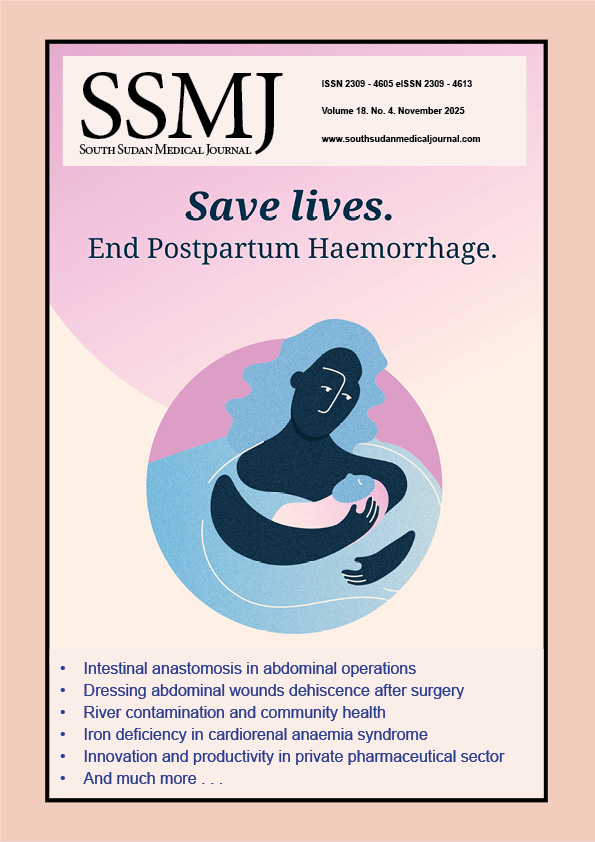The South Sudan Medical Journal exists to inform, educate and positively influence the development of Health Services in South Sudan.
The Journal is published quarterly in February, May, August and November.
Vision
To see well-trained, skilled professionals delivering high quality healthcare to the population of the South Sudan and beyond
Mission
To publish research and clinical guidance that will positively influence the development of healthcare services in South Sudan and beyond.
Scope
SSMJ publishes all types of articles: original research, reviews, survey reports/KAP studies, discussions and commentaries as well as case studies, clinical guidance and letters to the editor, in all fields of medicine and public health.
The SSMJ is licensed under a
Creative Commons Attribution-NonCommercial 4.0 International License
eISSN 2309-4613
SSMJ is listed on the African Journals Online (AJOL) and Directory of Open Access Journals (DOAJ). Visit these sites to learn more.
Mailing List
Join our mailing list to receive timely notifications of our quarterly issues and other communications.
SSMJ New Email Address:
Latest Issue:
Vol 18. No 4. November 2025

EDITORIAL
Save lives by ending postpartum haemorrhage
Edward Kenyi
The World Health Organization (WHO) launched the Consolidated Guidelines on the Prevention, Diagnosis and Treatment of Postpartum Haemorrhage (PPH) at the International Federation of Gynecology and Obstetrics (FIGO) World Congress in South Africa on the first-ever World Postpartum Haemorrhage Awareness Day on 5 October 2025.
Postpartum haemorrhage, severe bleeding after childbirth – diagnosed as a blood loss of 500 mL or more – is a leading cause of maternal mortality worldwide, and “affects millions of women annually and causes nearly 45,000 deaths.”
South Sudan has one of the highest maternal mortality ratios globally at 692 deaths per 100,000 live births in 2023. One of the key contributors is PPH, with infection and obstructed labour rounding up as the top three.
According to the FIGO President, Professor Anne Beatrice Kihara, the new guidelines “take a proactive approach of readiness, recognition and response. They are designed to ensure real-world impact – empowering health workers to deliver the right care, at the right time, and in a wide range of contexts.”
These guidelines were recommendations derived from the WHO study on deploying the “MOTIVE bundle” of actions when PPH is diagnosed, which in turn was partly based on the E-MOTIVE randomized controlled trial.

Statement on the Position of the Association of Gynecologists and Obstetricians of South Sudan (AGOSS) on the Use of Paracetamol During Pregnancy and Its Linkage with Neurodevelopmental Disorders Among Children
September 2025
Paracetamol, known as acetaminophen is an over-the-counter (OTC) pain reliever and fever-reducing medication. The drug is chemically named as N-acetyl-p-aminophenol, with its international brand name” Panadol”. It is classified as an analgesic (pain reliever) and also as antipyretic (fever reducer). It is produced in different formulations; these include tablets, capsules, liquid suspensions, suppositories and intravenous (IV).
AGOSS understands that pregnant women in South Sudan may require safe, easily accessible, and effective medications to alleviate fever, pain, or discomfort during pregnancy.
Based on the best available data, paracetamol (acetaminophen) is still one of the safest options for managing mild to moderate pain and decreasing fever during pregnancy, when used at approved therapeutic levels.
There is presently no conclusive scientific evidence that paracetamol, when used as intended, causes neurodevelopmental abnormalities (such as autism or ADHD) in children or congenital deformities in infants. There are limits to observational studies that show probable connections, such as potential confounding factors. AGOSS also acknowledged many statements on the use of acetaminophen released by well-known worldwide regulators and professional obstetrics associations.
